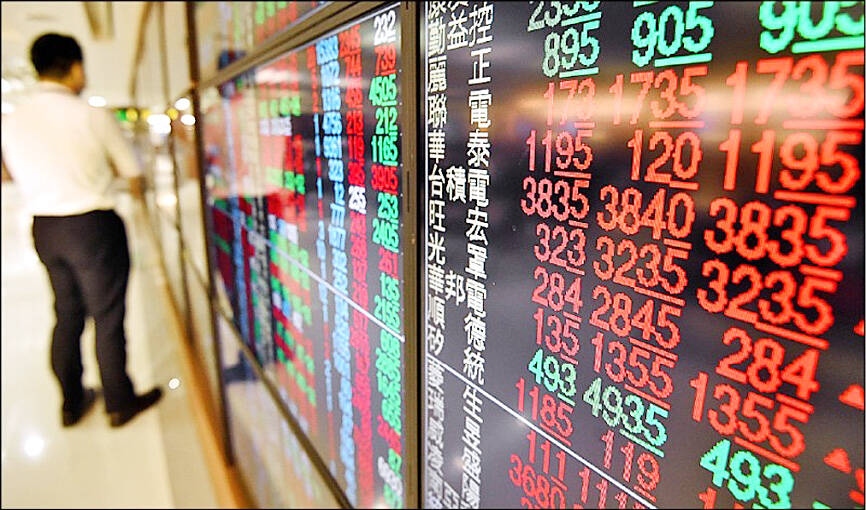Tax revenue last month rose 11.3 percent from a year earlier to NT$239.1 billion (US$7.4 billion), lifted mainly by gains in corporate and personal income taxes, as well as stock exchange transactions, the Ministry of Finance said yesterday.
Personal income tax revenue swelled 37.5 percent to NT$40.7 billion, as some firms distributed year-end bonuses last month, ministry statistics official Liu Shun-rong (劉訓蓉) said, adding that cash dividends and capital gains from property deals contributed to the increase.
There is a trend for firms and mutual funds to distribute cash dividends every quarter rather than annually, the ministry said.

Photo: Wu Chi-lun, Taipei Times
Corporate income tax revenue rose 5.7 percent to NT$9 billion as firms gradually emerged from an economic slowdown induced by inventory adjustments, sharp global inflation and monetary tightening, it said.
The improving macroenvironment lent support to the local bourse, which has seen capital inflows from mutual funds and foreign players seeking to take advantage of the artificial intelligence (AI) boom, Liu said.
Taiwan is home to the world’s largest contract manufacturers of high-performance computing chips, high-capacity servers, storage, memory chips and other electronics.
Tax revenue from securities transactions in March spiked 65.6 percent to NT$29.1 billion, with average daily turnover soaring 88.4 percent from a year earlier to NT$551.7 billion, the ministry said, citing Taiwan Stock Exchange data.
The TAIEX climbed above the 20,000 points this month as dozens of local tech firms participate in supply of global AI infrastructure and services.
A positive wealth effect helped boost tax revenue from land value gains, which rose 13.8 percent to NT$7.8 billion, Liu said.
However, tax revenue from tariffs and sales of goods shrank 3.4 percent and 12.7 percent to NT$142 billion and NT$13 billion respectively, owing partly to a decline in vehicle imports, she said, adding that delayed recognition of vehicle sales contributed to the lackluster figures.
In the first quarter, the ministry collected NT$557.6 billion of tax revenue, a 14.5 percent increase from a year earlier and ahead of the government’s budget schedule by 16.4 percent, she added.

Taiwan’s long-term economic competitiveness will hinge not only on national champions like Taiwan Semiconductor Manufacturing Co. (TSMC, 台積電) but also on the widespread adoption of artificial intelligence (AI) and other emerging technologies, a US-based scholar has said. At a lecture in Taipei on Tuesday, Jeffrey Ding, assistant professor of political science at the George Washington University and author of "Technology and the Rise of Great Powers," argued that historical experience shows that general-purpose technologies (GPTs) — such as electricity, computers and now AI — shape long-term economic advantages through their diffusion across the broader economy. "What really matters is not who pioneers

In a high-security Shenzhen laboratory, Chinese scientists have built what Washington has spent years trying to prevent: a prototype of a machine capable of producing the cutting-edge semiconductor chips that power artificial intelligence (AI), smartphones and weapons central to Western military dominance, Reuters has learned. Completed early this year and undergoing testing, the prototype fills nearly an entire factory floor. It was built by a team of former engineers from Dutch semiconductor giant ASML who reverse-engineered the company’s extreme ultraviolet lithography (EUV) machines, according to two people with knowledge of the project. EUV machines sit at the heart of a technological Cold

TAIWAN VALUE CHAIN: Foxtron is to fully own Luxgen following the transaction and it plans to launch a new electric model, the Foxtron Bria, in Taiwan next year Yulon Motor Co (裕隆汽車) yesterday said that its board of directors approved the disposal of its electric vehicle (EV) unit, Luxgen Motor Co (納智捷汽車), to Foxtron Vehicle Technologies Co (鴻華先進) for NT$787.6 million (US$24.98 million). Foxtron, a half-half joint venture between Yulon affiliate Hua-Chuang Automobile Information Technical Center Co (華創車電) and Hon Hai Precision Industry Co (鴻海精密), expects to wrap up the deal in the first quarter of next year. Foxtron would fully own Luxgen following the transaction, including five car distributing companies, outlets and all employees. The deal is subject to the approval of the Fair Trade Commission, Foxtron said. “Foxtron will be

INFLATION CONSIDERATION: The BOJ governor said that it would ‘keep making appropriate decisions’ and would adjust depending on the economy and prices The Bank of Japan (BOJ) yesterday raised its benchmark interest rate to the highest in 30 years and said more increases are in the pipeline if conditions allow, in a sign of growing conviction that it can attain the stable inflation target it has pursued for more than a decade. Bank of Japan Governor Kazuo Ueda’s policy board increased the rate by 0.2 percentage points to 0.75 percent, in a unanimous decision, the bank said in a statement. The central bank cited the rising likelihood of its economic outlook being realized. The rate change was expected by all 50 economists surveyed by Bloomberg. The